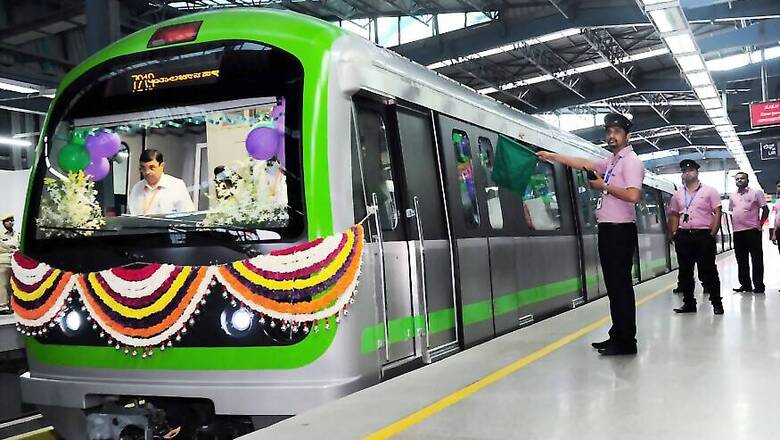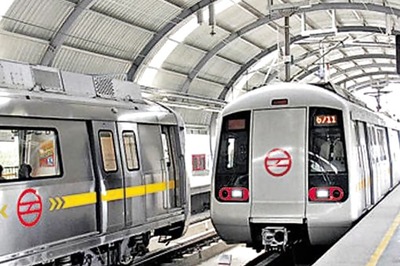
views
Bengaluru: Karnataka Chief Minister Siddaramaiah has said that Bengaluru’s ‘Namma Metro’ will temporarily redesign the signages and names of boards in metro stations without using Hindi language or script.
In a letter to the Union Minister for Housing, Narendra Singh Tomar, that sounds much like an FYI, Siddaramaiah says, “I hope you would appreciate that this is a sensitive matter. I would like to impress upon you that it will be better to follow a persuasive approach rather than a mandatory approach in the use of Hindi.”
Pointing out that the issue had led to protests across the city - first, through an online campaign and later seen in on-ground protests by many pro-Kannada groups - Siddaramaiah told the Centre this is part of the basis for the State’s move.
“Presently, it (the protests) has begun to take a violent turn with activists trying to deface the Metro name boards/signage. Although the State government has strictly dealt with those who defaced signage and maintained law and order, you would agree that in the face of a continued agitation and demands from intellectuals, it is counter-productive to insist on the use of three languages, including Hindi,” he writes.
The CM’s decision comes after he asked officials to check the language policy followed in other Metros in the country. He has tried to take a conciliatory, though firm, approach with the Centre, informing the Government of India in no uncertain terms that a decision to do away with Hindi boards has been taken.
In December last, the Union Urban Development Ministry had written to the BMRCL MD that a three-language policy (local language, Hindi and English) is mandatory in all non-Hindi speaking States.
Calling the three-language policy “not reasonable,” Siddaramaiah told Tomar, in his letter, that although both Centre and State governments have a 50:50 equity share in the building of the Metro rail, the financial burden of the State is much higher as it bears the cost of land acquisition, operating losses, and all debt-servicing. He further tells Tomar to “review his earlier decisions,” perhaps in a reference to the policy being ‘imposed’ on other States as well.
There has been great furore over the Centre’s attempt to thrust Hindi down commuters’ throats, with campaigners arguing that if a third language has to be brought in, it must be Tamil or Telugu – as a larger population in Bengaluru speak these two languages and Hindi should not be given any ‘special’ or backdoor-national-language status.
Though many in Delhi have asked the question ‘what’s the harm in Hindi, how will it hurt the people,’ this argument has been brushed aside as irrational. “There has been a violation of the official languages Act of the Karnataka government since 2011. It is good the CM has written a letter to the Union Government now, saying the Union government should not instruct Namma Metro to use Hindi,” says Arun Javagal, one of the active social media campaigners of #StopHindiImposition this past month.
Others hailed this as a victory of the Kannada campaign.
“It is good news for all those who have fought against the imposition of Hindi. The CM says redesign is temporary but it should be lasting,” said Vallish Kumar, another campaigner.
The CM’s decision comes a day after the Kannada Development Authority wrote to him, pointing out violations in language and recruitment policies by the BMRCL. The KDA has asked that all low-ranking jobs (cleaning, security staff) must be reserved for Kannadigas, as the BMRCL is a State government agency.
It has also questioned the need for seven Chief Engineers who are non-Kannadigas deputed at BMRCL, asking that they be repatriated to their parent departments – this, however, is only a recommendation and the government may not consider it as these top-ranking jobs require a certain skill-set and experience.
The decisions to rake up regionalism and identity with just ten months to go for elections are being seen as an election gimmick – but strangely, the Bharatiya Janata Party (BJP), which rules at the Centre, has remained silent on the decision – perhaps in an effort to avoid being seen as anti-Kannada, as that would have an impact too on its own chances in the Assembly elections scheduled for April 2018.




















Comments
0 comment